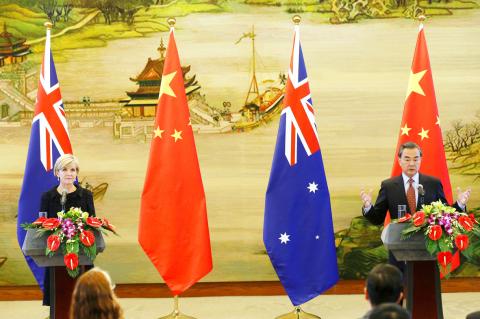China yesterday called on Australia to take into account the feelings of Asian nations as Canberra contemplates buying a fleet of submarines from Japan.
In some of his strongest remarks on the possible deal, Chinese Minister of Foreign Affairs Wang Yi (王毅) told reporters Australia should consider the context of Japan’s role in World War II in developing its military relationship with Tokyo.
Wang made the remarks to journalists during a joint briefing with visiting Australian Minister for Foreign Affairs Julie Bishop.

Photo: AP
“We hope that in military cooperation with Japan, Australia will take into full account this historical context and take into consideration also the feelings of Asian countries, because of that history,” Wang said. “We hope that Australia will take concrete actions to support the peaceful development of Japan and Japan’s efforts to uphold its pacifist constitution, and not the opposite.”
Australia this year is to pick the design for a new fleet of submarines in a deal worth as much as A$40 billion (US$28.51 billion).
Japan, which is offering a variant of its Soryu submarine, is competing against rival bids from Germany and France for the contract.
Washington is encouraging closer security cooperation between Japan and Australia.
Bishop arrived in Beijing on Tuesday after visiting Tokyo. Australia is seeking to deepen economic ties with China, its largest trading partner.
Bishop said a “comprehensive evaluation process” was underway about a submarine deal that would meet Australia’s capability and technological requirements.
“That is what will drive the competitive evaluation process that is currently underway,” she added.

AIR SUPPORT: The Ministry of National Defense thanked the US for the delivery, adding that it was an indicator of the White House’s commitment to the Taiwan Relations Act Deputy Minister of National Defense Po Horng-huei (柏鴻輝) and Representative to the US Alexander Yui on Friday attended a delivery ceremony for the first of Taiwan’s long-awaited 66 F-16C/D Block 70 jets at a Lockheed Martin Corp factory in Greenville, South Carolina. “We are so proud to be the global home of the F-16 and to support Taiwan’s air defense capabilities,” US Representative William Timmons wrote on X, alongside a photograph of Taiwanese and US officials at the event. The F-16C/D Block 70 jets Taiwan ordered have the same capabilities as aircraft that had been upgraded to F-16Vs. The batch of Lockheed Martin

GRIDLOCK: The National Fire Agency’s Special Search and Rescue team is on standby to travel to the countries to help out with the rescue effort A powerful earthquake rocked Myanmar and neighboring Thailand yesterday, killing at least three people in Bangkok and burying dozens when a high-rise building under construction collapsed. Footage shared on social media from Myanmar’s second-largest city showed widespread destruction, raising fears that many were trapped under the rubble or killed. The magnitude 7.7 earthquake, with an epicenter near Mandalay in Myanmar, struck at midday and was followed by a strong magnitude 6.4 aftershock. The extent of death, injury and destruction — especially in Myanmar, which is embroiled in a civil war and where information is tightly controlled at the best of times —

Taiwan was ranked the fourth-safest country in the world with a score of 82.9, trailing only Andorra, the United Arab Emirates and Qatar in Numbeo’s Safety Index by Country report. Taiwan’s score improved by 0.1 points compared with last year’s mid-year report, which had Taiwan fourth with a score of 82.8. However, both scores were lower than in last year’s first review, when Taiwan scored 83.3, and are a long way from when Taiwan was named the second-safest country in the world in 2021, scoring 84.8. Taiwan ranked higher than Singapore in ninth with a score of 77.4 and Japan in 10th with

SECURITY RISK: If there is a conflict between China and Taiwan, ‘there would likely be significant consequences to global economic and security interests,’ it said China remains the top military and cyber threat to the US and continues to make progress on capabilities to seize Taiwan, a report by US intelligence agencies said on Tuesday. The report provides an overview of the “collective insights” of top US intelligence agencies about the security threats to the US posed by foreign nations and criminal organizations. In its Annual Threat Assessment, the agencies divided threats facing the US into two broad categories, “nonstate transnational criminals and terrorists” and “major state actors,” with China, Russia, Iran and North Korea named. Of those countries, “China presents the most comprehensive and robust military threat